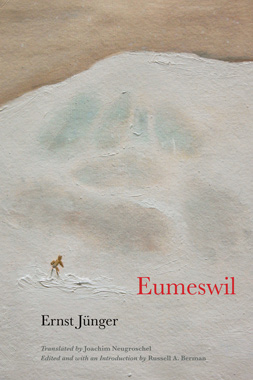Telos Press Publishing is pleased to announce that Ernst Jünger’s Eumeswil is now available for pre-order. The book will be released on September 1, 2015. Pre-order your copy today, and we will ship it as soon as it becomes available.
Eumeswil
by Ernst Jünger
Translated by Joachim Neugroschel
Edited and with an Introduction by Russell A. Berman
Release date: September 1, 2015
 Eumeswil, ostensibly a post-apocalyptic science fiction novel, is effectively a comprehensive synthesis of Ernst Jünger’s mature thought, with a particular focus on new and achievable forms of individual freedom in a technologically monitored and managed postmodern world. Here Jünger first fully develops his figure of the anarch, the inwardly liberated and outwardly pragmatic individual, who lives peacefully in the heart of Leviathan and is yet able to preserve his individuality and freedom. Composed of a series of short passages and fragments, Eumeswil follows the reflections of Martin Venator, a historian living in a futuristic city-state ruled by a dictator known as the Condor. Through Venator, the prototypical anarch, Jünger offers a broad and uniquely insightful analysis of history from the post-historic perspective and, at the same time, presents a vision of future technological developments, including astonishingly prescient descriptions of today’s internet (the luminar), smartphone (the phonophore), and genetic engineering. At once a study of accommodation to tyranny and a libertarian vision of individual freedom, Eumeswil continues to speak to the contradictions and possibilities inherent in our twenty-first-century condition.
Eumeswil, ostensibly a post-apocalyptic science fiction novel, is effectively a comprehensive synthesis of Ernst Jünger’s mature thought, with a particular focus on new and achievable forms of individual freedom in a technologically monitored and managed postmodern world. Here Jünger first fully develops his figure of the anarch, the inwardly liberated and outwardly pragmatic individual, who lives peacefully in the heart of Leviathan and is yet able to preserve his individuality and freedom. Composed of a series of short passages and fragments, Eumeswil follows the reflections of Martin Venator, a historian living in a futuristic city-state ruled by a dictator known as the Condor. Through Venator, the prototypical anarch, Jünger offers a broad and uniquely insightful analysis of history from the post-historic perspective and, at the same time, presents a vision of future technological developments, including astonishingly prescient descriptions of today’s internet (the luminar), smartphone (the phonophore), and genetic engineering. At once a study of accommodation to tyranny and a libertarian vision of individual freedom, Eumeswil continues to speak to the contradictions and possibilities inherent in our twenty-first-century condition.
“Set in a post-apocalyptic future, Eumeswil is a brilliant novel of ideas that explores the corruption of power and conformism, even as the anarchic hero charts a course into an unknown freedom. This is a gripping intellectual adventure that merges the tradition of dystopic fiction with philosophical lucidity and a rare aesthetic sensibility.”
—Adam Johnson, author of The Orphan Master’s Son and 2013 Winner of the Pulitzer Prize in Fiction
“Even today Ernst Jünger’s late writings are overshadowed by his early work, whose focus on war and violence has largely defined the author’s reception in the English-speaking world. In short, the warrior and right-wing revolutionary have received more attention than the mature postwar writer. The novel Eumeswil is a good example of this persistent neglect. Its highly complex and ambiguous narrative is a brilliant work coming out of the modernist European tradition. Jünger’s ironic use of a first-person narrator undercuts any dogmatic understanding of the novel’s worldview, recasting the futuristic claims of the utopian tradition in the mode of skeptical reflections.”
—Peter Uwe Hohendahl, Jacob Gould Schurman Professor Emeritus of German Studies and Comparative Literature, Cornell University
ISBN 978-0-914386-52-0
Paperback • 330 pages








